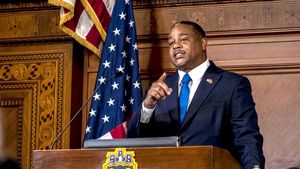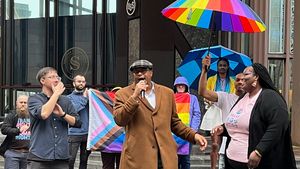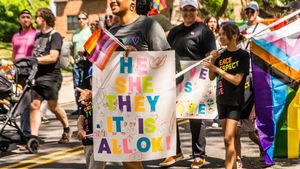Welcome to How Gay Is It?Out's review series where, using our state-of-the-art Eggplant Rating System, we determine just how queer some of pop culture's buzziest films and TV shows are! (Editor's note: this post contains spoilers for Warner Bros' Joker: Folie à Deux.)
Knock Knock.
Who's there?
Arthur Fleck.
Arthur Fleck who?
That's a real question the Joker character asks in the new movie Joker: Folie à Deux, and the question the movie itself asks, attempts to answer, and then stops caring about by the end.
Todd Phillips and Joaquin Phoenix are back with the musical sequel Joker: Folie à Deux, following the further misadventures of Arthur Fleck, otherwise known as the Joker, as he meets and falls in love with Harley Quinn (called Lee for short here), and goes to trial for the murders he committed in the first film.
The film starts with an animated sequence that isn't funny, isn't cartoony, and doesn't set any kind of mood or give us any kind of introduction to the world.
This version of Gotham City isn't one with Batman, superpowers, or a clear time setting, so things like Live! with Murray Franklin from the first film build the world and give us an idea of what our setting is. This cartoon wasn't reminiscent of animation from any time or place other than 2024 in this movie.
After that, we see what Arthur's lonely life is like in Arkham Asylum, where he and the other inmates are tortured and beaten regularly. When walking to an interview with his lawyer, he sees a woman in a music therapy class, and their eyes lock onto each other.
This woman, Harleen Quinzel, or just Lee (Lady Gaga), says that she's a big fan of Arthur's. She's from his same neighborhood, she was also abused by her parents, and now she's locked up.
What a waste of Lady Gaga. When it was announced that she was playing Harley Quinn and that the film would be a musical, gays everywhere (including me) were excited!
Gaga in a musical playing an insane and manipulative criminal sounds like a dream come true. Unfortunately, it was one of those dreams that starts out interesting but doesn't really go anywhere. She doesn't even dance on the Joker stairs!
Now that Arthur's life has meaning again, he and Lee break out into song after song, interspersed with Arthur's trial and his grappling with the central question of the film: Is he really Arthur, or is he really the Joker?
Unfortunately, the movie doesn't really care about any of this. Lee is in the mental hospital one day, and the next she's out. She lies to Arthur about every detail in her life, then he forgives her. He's in police custody, then he escapes, then he's right back in again. He becomes the Joker again, then he says the Joker never existed.
Meandering is a word that's overused in movie reviews, but it truly fits here.
The first Joker film was at least not boring. It had a message, a story, and a direction. All three are missing here, replaced with barely connected scenes that only give us more Joker screen time that don't create anything new.
Phillips seems to know what nihilism and edginess look like, but not how or why either actually works.
There's a famous quote from fellow edgelord comic book movie director Zack Snyder, who compared his Watchmen movie to Christopher Nolan's Dark Knight films.
"Everyone says that about Batman Begins. 'Batman's dark.' I'm like, 'Okay no, Batman's cool.' He gets to go to a Tibetan monastery and be trained by ninjas, okay? I want to do that," he said. "But he doesn't like, get raped in prison. That could happen in my movie. If you want to talk about dark, that's how that would go."
Ladies, theydies, gentlemen, and jokers, the Joker gets raped in prison in this movie. I hope Zack Snyder is happy.
Phillips' version of nihilism seems to be him laughing in the faces of everyone who thought his first Joker movie was cool.
If it's true that you should never meet your heroes, this movie argues that you should never watch sequels about your heroes. And if you Joker is your hero, Phillips seems to think very little of you.
In the movie, fans of the Joker are portrayed as a mindless, violent mob whose hero turns his back on them and was lying the entire time. Finally, the man they look up to and love is unceremoniously killed in a dirty hallway by an unnamed man.
In the end, it doesn't matter if he's really Arthur or the Joker. It doesn't matter if he wins his trial, it doesn't matter if society is broken. It doesn't matter if he gets the girl. It doesn't matter if he dies. And it doesn't matter if you see this movie.
Now for the question we at Out love to ask: How gay is It?
Lady Gaga is bisexual, and in most versions so is Harley Quinn, and Joker does kiss a man on the lips. But while I watched, I forgot that homosexuality existed for a couple hours. That was the darkest thing about the movie. 1 star over, and zero eggplants on Out's Eggplant Rating System.

Joker: Folie à Deux is now playing in theaters.



























































































Cooper Koch and twin bro spark controversy with eye-popping 'White Lotus' parody